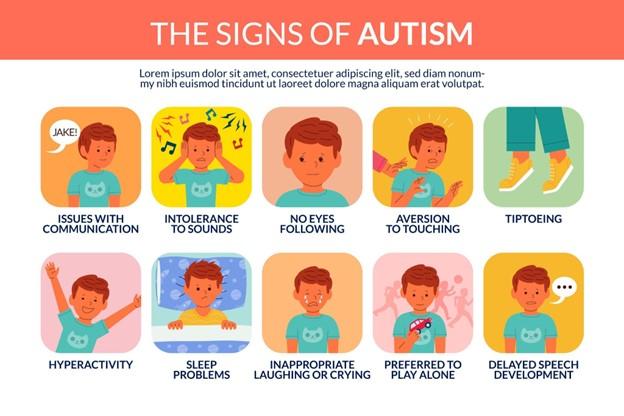One word that most people associate with parents having disabled kids is compassion. Compassion, according to Merriam-Webster‘s definition, is a sympathetic consciousness of the other’s distress and one’s desire to ease it. Whether intentional or not, people always pity for the parents with disabled kids. There are a lot of misconceptions about disabled kids and their families, but compassion is the last thing they need. If you’re unsure how to talk with them, Stephanie, a mom of a son on the spectrum and a toddler, shares her insights on talking to parents with disabled kids. Hope that helps you!
Related Reading:
- 12 Things can Help Raise Kids with Diversity and Inclusion in Mind
- 10 Ways to Be an Upstanders in Bullying
- 8 Type of Intelligence – Every Kid is Gifted
- How to Stop Kids from Chewing Their Shirt
- 5 Life-Changing Lessons by Parenting Autism Kids

Table of Contents
7 Tips on How to Talk with Parents with Disabled Kids
1. Be Mindful of Social Cues
This is the number one rule everyone should follow when conversing with parents of disabled kids. Like their kids, their parents also have unique ways of coping and dealing with the situation. Some love talking to let out all their worries, frustrations, and stress levels; others would rather stay silent about them.
Hence, it’s always appreciated if you don’t immediately ask us difficult questions. Questions like how we cope as a family and other emotional stuff are awkward if you’re still an acquaintance.

Learn to be tactful. Every question you have in your curious mind has the right time to be answered. So, don’t probe further if you feel the mom or dad isn’t receptive to the deep and emotional questions. Some things, indeed, are best left unsaid.
Also, since parents of disabled kids also go through the grief cycle, it’s best to learn where they are at first. According to Raising Children, most parents with disabled kids go through various emotions.

When I first learned that my son has autism, I felt a mixture of sadness and relief at the same time. I felt ashamed to share even the tiniest detail about him and would wait for others to notice his quirks. I prefer to DM people about my son’s diagnosis, even on social media. With my son’s ongoing therapy, special education classes, and joining several online support groups, I don’t feel embarrassed. I already embraced his uniqueness and freely told anyone he was on the spectrum.
After all, we must be our son’s number one advocate and voice his concerns if he can’t.

2. Get to Know the Child Outside of His Disability
Disable kids aren’t too different from other kids. The real challenges are they find it hard to relate their needs and abilities with their peers and other adults. So, if you’re curious how the parents cope with the high-demand care the disabled kids need, get to know their kids first. Start with the harmless questions: what’s the child’s name, age, if he’s going to school? Once the conversation starts rolling, move on to asking about his interests. If you notice unusual behavior, you may or may not ask about it yet if you’re unsure how the parents will react.
So, take the child as is and get to know him better. If you know how to fingerspell or communicate using alternative and augmentative communication, don’t hesitate to do so. Not only are you able to engage with the child, but you help lighten up that parent’s day by interacting with the kid.

In this way, you get to build rapport with the parent, hinting that you’re genuinely interested in the kid, not his diagnosis.
I don’t have experience talking with a stranger about my autistic son. But my closest friends always ask how my son’s doing and his current interests. They even play games with him and his younger brother. For them, his diagnosis is just one part of what makes his personality unique.
3. Never Give Unsolicited Advice
It’s common for us parents to share our parenting experiences. Through these discussions, any parent can gain insight into how others solve the most common parenting woes. They can even be an avenue for the parent to vent out their current worries.
Don’t get me wrong on this. For the most part, advice is good as it provides another perspective that a particular parent is experiencing. But, if it’s unsolicited, a piece of advice that has not been asked, then there’s a problem. Unsolicited advice, no matter the intention, is often laced with judgment. And there’s usually a comparison between one’s parenting and the children’s achievements.

Hence, it would be best if you waited for a cue or for the parent himself to ask you for your opinion. Even if you are asked for your perspective, choose your words correctly. Sometimes, a harmless comment can be insulting to that parent.
Recently, my son displayed sensory-seeking behavior while participating in their developmental games. He would lie on the dusty open gym floor (imagine a billionaire relaxing in a reclining chair on the beach) and even put dirt in his mouth. His homeroom teacher is chill with the first behavior, as it’s what he’s doing ever since.
But, the other teacher, though she voiced her concern over my son eating dirt, subtly implied judgment with her question. She asked whether he’s been attending therapy and if he’s been doing this at home. I felt offended deep inside, but I answered, “I don’t know why he’s doing it recently.” Hearing those questions is like a failing grade on my parenting report card.
I’m just glad my husband chose to listen that time. He allowed me to rant when I opened up to him about how I felt when I heard those “heartless” questions.

4. Stop Asking When The Child Will Be “Cured”
Not all disabled kids have conditions with a surefire treatment, and not all those conditions are treatable. And not all are diseases that can pass on to other people.
Sad to say, not everyone surrounding a disable kid, even his very own family members, understand this. Most people aren’t familiar with what autism is, and they would think the child will have to pop a pill and drink a super dose of vitamins to cure it. The worst part is, if they can’t contain their curiosity, they will ask what medications he’s taking to fix that “disease.”

As much as we parents would love to dive deep into what autism means, we’re too tired to explain it in-depth. Tired physically, mentally, spiritually, and emotionally, too. Some even are at the point of experiencing burnout. The question can also sound insensitive if you don’t word it correctly.
I remember the day we got our son’s diagnosis. I was messaging my closest friends and family about what the doctor said and what we should do. Most of my friends were discreet enough to ask how we were feeling as parents and encouraged us with the next steps. There was one, though, that asked what the diagnosis of autism meant and if he will outgrow it. Another term for “cured.”
The moment I read that, I was like doused with ice-cold water. It was like highlighting that my son’s condition will be with him until he becomes an adult. Though I still explained to her what autism meant, I was slightly offended by it.
So, if possible, refrain from asking sensitive questions and do your research. We would instead you stay silent first and do the questioning later.
5. Don’t Start a Conversation with Complaints and Criticism
Disabled kids have varying conditions, some of which even aren’t apparent. The kid may look like any neurotypical kid. But when he starts screaming, flapping his hands with excitement, and jumping like crazy, that’s when the people know there’s something amiss with him.
Others shrug the behavior off and go on with their day. Some would stare at you, silently telling you to do something to stop the commotion. Others would be more vocal and ask you to do something to stop them.

Though such a gesture is well-meaning, it’s the last thing the parent needs to hear. The mom or dad is already embarrassed enough and is distressed at how to calm their child. When you see a situation like that, gently introduce yourself to the parent first. Then, gently ask the parents how best you can help them.
If they need to go to a calm place, lead them to it. Whatever they need at the moment, do your best to help. You may opt to stay with the family if you have the time. Once the ordeal is done, and if the parents are also up to it, hug them. Whisper some encouraging words. Say that they’re doing great even if they feel crappy about it.
I haven’t experienced having a person shout at me to shut my kid off when he’s experiencing a meltdown—but getting the judgmental stares. I have already. But, even if I see those strangers staring, I shrug off the unwelcome thoughts and focus on calming my child.
Resilient Educator has some lovely tips on how best to talk with parents of disabled kids without complaining.

6. Focus on the Child’s Abilities
Like neurotypical kids, disabled kids also have unique abilities worth showing off, and it’s just that their disabilities are highlighted more than their talents. Reading Rockets lists the potential discounting of the kid’s abilities as a primary concern for parents with disabled kids.

This concern often results in parents fearing how their kids would fare in a school. After all, no kids are immune to bullying, as Stomp Out Bullying cites. Hence, it’s not unusual to see parents becoming overprotective of their kids.
If you have the privilege to work with kids, find ways to discover that kid’s talent. For all you know, these children are hidden geniuses waiting for someone to awaken their gifts.
Related Reading:
- 5 Examples of Turn Chores to Habits, Toddlers and Young Schoolers
- Raise a Child in the U.S. and Netherlands in 2022 – the Average Cost Comparison ($300k vs $100k)
- 8 Best Positive and Gentle Parenting Books for Toddlers’ Parents
- Room Parent Feedback – Parents Involvement in Primary School
- How to Keep Your Child Safe: 8 Pedophile (Child Molester) Warning Signs

Though we have already accepted my son’s diagnosis, there are times when we can’t ignore his peculiar behavior. That’s why when we take him and his younger brother for a stroll, I can’t help but be anxious about others’ reactions. We occasionally get stares whenever he squeals in frustration whenever we are stuck in traffic. But we eventually learned to shrug them all off.
Good thing none of our co-passengers let out snide remarks. But how we wish they, too, would ignore my son’s screaming and focus more on how behaved he was throughout the ride.
7. Avoid Comparing Disabled Kids with Neurotypical Peers
Comparison is the hardest thing not to do when you’re a parent. Parents can’t help but exchange notes on what their kids cannot and can do and add the occasional subtle hint of how their kids are better than others their age.
But all these hopes and aspirations can be wishful thinking for parents with disabled kids. The moment they learn of their child’s diagnosis, all their hopes for that “dream” child are shattered, including their plans for his future.
Keeping that in mind, it’s always considerate to avoid making any comparisons from the get-go. Though parents do this to boost their child’s skills and learning, making comparisons can lower their confidence levels. Comparisons often highlight what the disabled kids cannot do compared to his neurotypical peers.

You should set benchmarks for the child instead. By benchmarking, you put a standard based on the kid’s abilities and use that to measure where he’s at. In this way, both parents and the child can track their progress.

Being an achiever myself, I’m not new to comparisons. But, one lesson I’ve learned from having a son on the spectrum is to learn how to focus not only on his abilities but his progress. Whenever I find myself unconsciously comparing him with the other kids, I only think about how much progress he’s made since he started therapy.
Yes, sometimes we special needs parents feel we’re still a long way from our goals for the kids. But we don’t need to be reminded what our child lacks. Instead, we value hearing your encouragement more.
Respect and Kindness Always Go Hand-in-Hand
Whether parenting neurotypical or disabled kids, you can never go wrong with being kind to everyone you meet. Everyone has their strengths and weaknesses, including disabled kids, and the last thing any parent would want to hear is some stranger judging their child for not behaving as expected.

Hand-in-hand with kindness is also respect. With everyone having differing views on things, parenting included, it’s better to refrain from saying anything if you have nothing good to talk about. Parents with disabled kids already have lower self-esteem than typical kids, and they don’t need to hear more degrading remarks.
Keeping these in mind, let’s make this world a better and happier place for disabled kids and their parents.
About Me
Hi, there. I am Lin. Together with my husband and two kids, we live in the beautiful Netherlands in Europe. I am dedicated to self-development, creating quality time for the whole family, and fully supporting kids with their potentials and possibilities with all I have learned from engineering, MBA, and 10+ years of working experience in the energy sector.



3 Comments
Comments are closed.